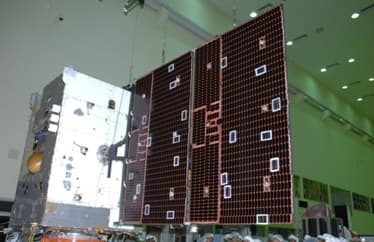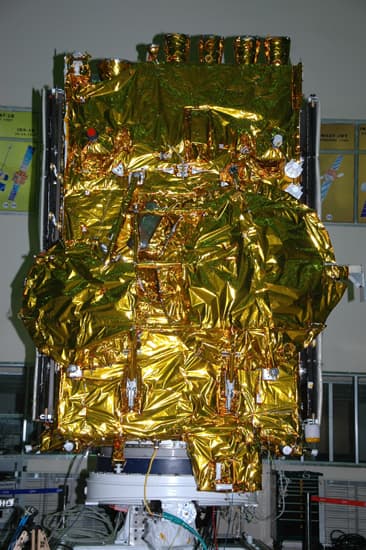GSAT-7 - India's First Defence Satellite Launched Successfully - Confirms ISRO
ISRO - Indian Space Research Organization has confirmed that the launch of GSAT-7, India's first ever defence satellite was successful. The launch was scheduled at 2:00 AM today morning from Kourou, French Guiana. The satellite is being carried into the space by Ariane-5 launch vehicle and has successfully placed the GSAT-7 into the intended Geosynchronous Transfer Orbit aka GTO after flight of about 34 minutes and 25 seconds. The GSAT-7 will help step up India's maritime defence capabilities and security. The GSAT-7 will be used by the Indian Navy for its multi-band communication spacecraft expected to be operational by the September 2013.

As the launch team planned, ISRO's master control facility aka MCF at Hassan in Karnataka started receiving the signals five minutes prior to the separation of the launch vehicle (Ariane-5) and the GSAT-7. The satellite has already deployed its solar panels and ISRO has confirmed that all the machines are functional just as planned. Initial tests and self-checkups of the satellite indicated that the satellite is in good health.
Once further testing is done, the orbit of the satellite will be raised to Geostationary Orbit (~36,000 km altitude) through three orbit raising maneuvers. This will be achieved by firing of GSAT-7's Liquid Apogee Motor (LAM). The team of scientists is already preparing for the fire which is scheduled tomorrow. The satellite will reach its final destination by September 4, 2013. Once the satellite is in its final resting place, GSAT-7's communication transponders will be turned on.

ISRO's GSAT-7 is an ambitious project with a total investment of about Rs. 185 crore. ISRO officials informed the media that the satellite is quite important from India's security point of view. We congratulate ISRO on successful launch of GSAT-7! If you have more information about this satellite and how it will be used by Indian Navy, please share your knowledge through comments below.
Via: #-Link-Snipped-#

As the launch team planned, ISRO's master control facility aka MCF at Hassan in Karnataka started receiving the signals five minutes prior to the separation of the launch vehicle (Ariane-5) and the GSAT-7. The satellite has already deployed its solar panels and ISRO has confirmed that all the machines are functional just as planned. Initial tests and self-checkups of the satellite indicated that the satellite is in good health.
Once further testing is done, the orbit of the satellite will be raised to Geostationary Orbit (~36,000 km altitude) through three orbit raising maneuvers. This will be achieved by firing of GSAT-7's Liquid Apogee Motor (LAM). The team of scientists is already preparing for the fire which is scheduled tomorrow. The satellite will reach its final destination by September 4, 2013. Once the satellite is in its final resting place, GSAT-7's communication transponders will be turned on.

ISRO's GSAT-7 is an ambitious project with a total investment of about Rs. 185 crore. ISRO officials informed the media that the satellite is quite important from India's security point of view. We congratulate ISRO on successful launch of GSAT-7! If you have more information about this satellite and how it will be used by Indian Navy, please share your knowledge through comments below.
Via: #-Link-Snipped-#
0
